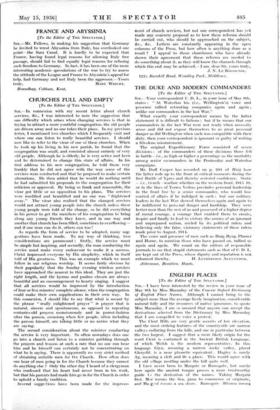SIA, — Your correspondent C. D. L., in your issue of May
8th, states " At 'Waterloo his (i.e., Wellington's) voice and presence rallied retreating companies again and again ; unlike our commanders in the last War."
What exactly your correspondent means by the latter statement it is difficult to fathom ; but if he means that our commanders in the last War were not ready when necessity arose and did not expose themselves to as great personal danger as did Wellington when such was compatible with their duty, then your correspondent is ignorant or guilty of writing a frivolous misstatement.
The original Expeditionary Force consisted of seven divisions : of the commanders of these divisions three fell in battle—i.e., as high or higher n percentage as the mortality among senior commanders in the Peninsular and Waterloo campaigns.
Mr. Duff Cooper has recorded on p. 204 of Haig how the latter rode up to the front at critical moments during the first Battle of Ypres and thereby restored confidence. Static —i.e., trench—warfare whether on the western front, 1915 in, or in the lines of Torres \'edrns precludes personal leadership in the front line by a senior commander, who would lose control of affairs if he indulged in such : but our military leaders in the last War showed themselves again and again to be indifferent to perscnal danger and hardship. They were better men than the rest of us and possessed of a higher degree of moral courage, a courage that enabled them to create, inspire and finally to lead to victory the armies of an ignorant and unprepared nation, misled by its political rulers and believing only the false, visionary statements of these rulers made prior to August, 1914.
The voice and presence of men such as Haig, Byng, Plainer and Horne, to mention those who have passed on, rallied us again and again. We count on the editors of responsible journals to see that stupid statements such as that of C. D. L. are kept out of the Press, whose dignity and reputation is not






















































 Previous page
Previous page